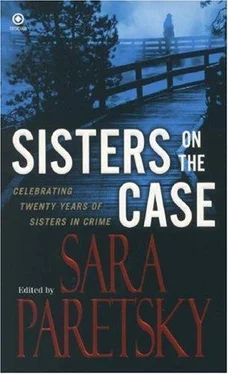‘‘But the clan has had problems since Elosa became shaman. Our harvest has failed. The fish have been few. The tribe has become divided.’’
‘‘But I have done nothing to cause the division.’’
Rogar’s mother looked away. ‘‘Elosa wanted Rogar for her own daughter. When he took a bride from far away, it made Elosa fear that the people would think her foolish.’’
She put her arm around Amaya’s shoulder. ‘‘Don’t worry! Rogar wanted you! He is smart, that son of mine. Elosa will become interested in something else. Already she is looking for another husband for her daughter. The trouble will go away.’’
But the trouble did not go away. It grew, and it grew until it was not only between Amaya and the other women of the clan, but until it was also between Rogar and Amaya. They had not known each other well, Amaya realized. They’d only had a few days together without the interference of Elosa. Now Rogar grew impatient, hard to please. Their lovemaking grew more awkward, instead of more comforting. Amaya felt she had ceased to please Rogar. And she had wanted to please Rogar. She wanted to love Rogar.
Amaya had hoped the ritual trip back to her own clan would help. But there they found greater disaster. Disease had come, and her uncle had died, and her sister and her sister’s husband. The only one left was Tani.
The baby had grown since Amaya had left with Rogar. Now she was walking. She was staying with the great-grandmother, but the great-grandmother could not run after her. Tani would hide. When the great-grandmother called, she would laugh. But she would not come. Amaya saw that the great-grandmother could not take care of her.
Rogar had hesitated when she asked if she could bring Tani back to his clan’s island. ‘‘She is a fine, strong baby,’’ he said. ‘‘But she is just a girl. And our clan’s crop was small this year.’’
Amaya had not pleaded. But Rogar had also seen that the great-grandmother could not care for Tani. And perhaps Tani had won him over herself, with her baby smiles and games. He had grown fond of playing with her, taking her into the lagoon to splash.
‘‘We will take her back,’’ he had said finally. ‘‘She is a brave little girl. She laughs when water splashes her. She will be adopted by my tribe.’’
But that did not happen. Elosa had hated the baby, just as she hated Amaya. She had refused to take Tani into the clan. Then she had decreed that the clan did not have enough food, and she said that the child must die.
‘‘It is not right for this stranger child to take food from the mouths of our clan,’’ she said. ‘‘Rogar must put her in the water.’’
Amaya’s heart broke, but her hard outer shell remained solid. She had hidden behind it all afternoon.
Rogar had argued with Elosa, tried to convince her that the clan’s resources were not so few that one tiny girl would cause others to starve. But Elosa was firm.
‘‘You must put the girl in the sea tomorrow-as soon as the sun rises,’’ she said.
Amaya could not argue. Rogar had spoken truly. Her own clan followed that custom, too. If food was scarce, the oldest and the youngest among them must die. It was best for the weakest to die, to allow the strongest to live.
But Amaya did not want Tani to die. She was her sister’s child. She was the final link with her own clan, her own island. If Tani died, Amaya would be left among a strange people, subject to a strange husband, with no one to care about and no one to care for her. And Tani was a strong child. She would grow into a strong woman who would help her clan.
But what could Amaya do?
Amaya nestled behind her hard coconut shell and thought.
Wildly she thought of killing Elosa. She could take the club she used for breaking coconut shells. She could creep up upon Elosa’s house. She could hit the witch in the head. The shaman would die.
A feeling of pleasure swept over Amaya at the thought, but it was closely followed by a shudder that shook her whole body and rattled her teeth.
No, she could not kill Elosa. Even if she managed to creep into Elosa’s hut undetected, Rogar’s people would guess who had done it. She would be killed. Tani would still die. Killing Elosa would accomplish nothing, except that Amaya would herself die and her spirit would be condemned to roam the sea forever, never finding rest on the heavenly island.
Could she run away? Could she steal a canoe and go back to her own clan?
Amaya could paddle a canoe, of course. Everyone could do that. But only men, men like Rogar who had been taught to read the stars and the currents, could go so far as her native island and be sure of finding it.
Could she run away to the forest? She could take Tani and hide. She could find food for them there.
But Amaya knew that would give her only a few days. Rogar’s island was not her native place. She knew only parts of it. She might be able to hide from a stranger, but she could never hide from Rogar and the men who had hunted all over that island and from the women who had gathered food all over it. She would have to sleep. Rogar’s people knew where the water was, and she would have to have water. If food was scarce, the women would be looking for it everywhere. They would soon find her.
A sob bubbled up from Amaya’s soul, like water bubbling from a spring. It almost cracked her coconut shell coating. She choked it back, and she did not move. But she saw no way to save Tani.
Was Rogar right? Was obeying the shaman the right thing to do? Did she have to let him take Tani into the water?
Oh, she knew it was the law, the way of the people. As Rogar had said, it was the way of her own island. Her mother’s mother had become ill in the year the crop had been so bad. When she had become too sick to work, she had stopped eating. The family had grieved, but the old woman had turned away from food. She had refused water. ‘‘It is time,’’ the old woman said. Her tongue grew thick. Her daughters keened. And in three days she had died. Everyone had admired her action.
And when the wife of the headman’s son gave birth to a child with a crippled foot, the mother had wept, but she had not argued. The headman himself had taken his grandson and put him in the sea to die.
Life on the islands was hard. The strong must not be held back by the weak. That was the ancient law. Amaya knew that. If the law was not obeyed, the islandclans would not be strong and clever. They would not conquer their enemies-the other tribes who wanted their territory, the fierce beasts who lived in the sea and in the forests, the very hardness of life.
But Tani was not weak! Elosa had not said she must die because she was weak. That year’s crop had been poor, but there was enough. Rogar said so. His father said so. But Elosa had not listened. She said Tani must die.
Tani was to be killed because she was a strange child.
No, Amaya thought, that was not true. Tani was to be killed not because the baby was strange, but because she-Amaya-was strange. Elosa hated Amaya, not Tani. But Amaya was married to one of the clan’s young warriors. Elosa did not dare attack Amaya directly. She had decreed Tani’s death because that was the cruelest thing she could do to Amaya. And this would not be the last thing she did to Amaya. Elosa might not dare condemn her openly, but she would find ways. Amaya’s own fate would be like Tani’s.
Already Elosa had threatened Rogar because he argued with her over the baby. Amaya’s presence here on Rogar’s island was all wrong. She was unhappy, and she was hurting Rogar by being there. She loved Rogar, and she did not want him to be hurt because of her.
Amaya, hidden inside her coconut shell, finally knew what she had to do.
She stirred, lifting the sleeping baby and holding her close, murmuring softly. ‘‘Little pet. Sweet one. I love you. We will always be together.’’ Standing up, she went outside, into the dark. She took the path to the beach, where the waves were high, not to the friendly lagoon.
Читать дальше












